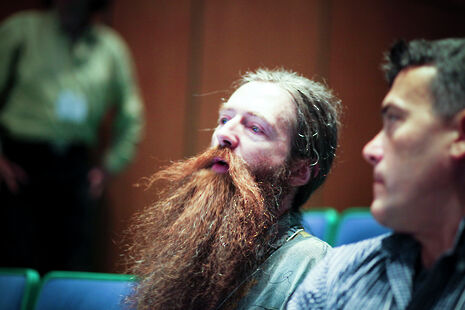Aubrey de Grey on ageing
Eddy Wax reports on de Grey’s fascinating talk in Trinity College

"The first human beings who will live to be 1,000 years old have already been born." This jaw-dropping claim by scientist Aubrey de Grey drew a fifty-strong crowd to Trinity last week to hear the controversial gerontologist talk about the ramifications of defeating the ageing process.
De Grey argued that defeating ageing is the world’s most pressing issue and expressed astonishment that the medical world had paid it so little attention in the past. Indeed, sickness relating to old age is the biggest cause of death on the planet, killing over 100,000 people every day. But de Grey believes all that can change.
He compared the ageing process to the operation of any machine that has moving parts. Over the course of its use, the machine will end up doing more damage to itself than it had originally been set up to sustain. In the same way, the human body is continuously sustaining damage to its metabolic system that eventually leads to pathology in old age. By periodically repairing these various different types of damage, of which de Grey has identified an exhaustive list of seven, we can keep the level of damage down below the threshold and thus keep age related illnesses at bay.
It all seemed fairly plausible to me, as a clueless languages student and proud holder of a GCSE in Biology – de Grey dealt impressively well with the criticism that was thrown at him. In fact, he seemed to relish the chance to knock down any potential challenges to the ethics or the feasibility of his plans, often replying to an audience member’s point with a broad grin, a knowing look and a shout of “that’s balls!” He seemed to have heard it all before.
To those who said it would be impossible to pay for the mass release of these rejuvenating treatments fairly to the public, he said the therapies would quickly pay for themselves, as the elderly would still be able to contribute to the economy instead of consuming wealth. He replied to worries about overpopulation by claiming that new eco-friendly technologies would make it possible for more people to live on the planet. And to those who claimed it was immoral to deny potential humans in the future the right to life he replied that they themselves were equally immoral for failing to spend their own lives having children whenever possible.
This was an intriguing and unsettling talk. I am still no clearer as to whether living much longer, even without suffering at the end of my life, would be entirely positive. Perhaps I’ll have five hundred years to figure it out.
 News / East West Rail proposes new Cambridge East station26 November 2025
News / East West Rail proposes new Cambridge East station26 November 2025 News / News in Brief: Cat-astrophic climbs, concealed collections, and Christmas festivities25 November 2025
News / News in Brief: Cat-astrophic climbs, concealed collections, and Christmas festivities25 November 2025 Comment / Don’t get lost in the Bermuda Triangle of job hunting 24 November 2025
Comment / Don’t get lost in the Bermuda Triangle of job hunting 24 November 2025 Theatre / How to plan an American stage tour 25 November 2025
Theatre / How to plan an American stage tour 25 November 2025 Features / Why are we so obsessed with getting more done?26 November 2025
Features / Why are we so obsessed with getting more done?26 November 2025









